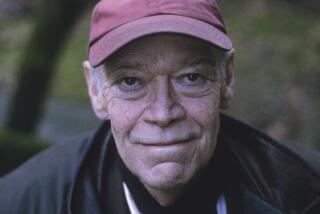Rambo as role model
- Share via
Whether that dangling “w” in the title is some kind of legal concession or just a cute reflection of its protagonists’ youth, it more or less sets the tone for “Son of Rambow,” a dewy-eyed, plaintive, unafraid-to-be-adorable exercise in stylish nostalgia for a simpler time, when hair was big, cellphones were bigger and Sylvester Stallone was huge.
“Rambow” is the second film by the duo Hammer & Tongs (director Garth Jennings and producer Nick Goldsmith), best known for the “Hitchhiker’s Guide to the Galaxy” and sundry Beck, Blur and Supergrass videos. Shot and designed in a romantic pop kitsch style to match their oeuvre, it’s the story of two fatherless English boys who form an unlikely friendship over their shared love of “First Blood” and their general alienation.
Will Proudfoot (Bill Milner) lives with his mother, sister and catatonic grandmother in a plain house with strict rules. His family belongs to a religious sect called the Brethren, which forbids his watching TV or films, so Will finds himself ejected from class every time his teacher gets lazy and pops an educational film into the VCR. Lee Carter (Will Poulter) is a hellion with fiendish eyebrows whose father left the family and whose mother spends most of her time in Spain with her new husband. Lee lives with his aloof elder brother Lawrence (Ed Westwick) in a gaudy mansion adjacent to the family business, an elder care facility. Lee often finds himself ejected from class as well, though for other reasons than Will. It’s in the hallway that Lee meets Will and recruits him as stuntman in a homemade sequel to “First Blood,” which he hopes to enter into a competition.
It doesn’t take a Lacanian theorist to figure out what’s going on here, and, anyway, the themes are handled lightly, without fuss. The two boys have nothing in common save, of course, for their outsider status and desperate need for a working male role model. They find the latter in the hypertrophied, slow-lipped figure of Stallone as Rambo. Very quickly, Will’s role as stuntman expands to that of star -- he casts himself as the son of Rambo, on a mission to rescue his father, throwing himself into a variety of death-defying situations, to Lee’s great delight.
Meanwhile, Will endures the indignities of growing up in a weird religious household improbably ruled by the head of the church, who has the hots for his mom, and Lee tries desperately to please his cold, supercilious older brother. The kids at school all seem to inhabit a politely anarchic post-punk bubble that turns the sixth form commons room into a mosh pit and yet somehow renders them collectively helpless before the charms of a foreign exchange student in red ankle boots and a Robert Smith forelock. When the absurdly cool Didier (Jules Sitruk) arrives, dreaming of stardom, he complicates Lee and Will’s friendship and their movie.
If Lee’s relationship with the AV arts goes back to his stint pirating movies for his brother, Will’s more sheltered (and heated, imagination-wise) addiction has been to drawing. He has turned his Bible into a repository of narrative flip-books chronicling explosive events in his life. As movies glorifying the unfettered imagination of children often do, “Son of Rambow” includes fantasy animated sequences reminiscent of Peter Jackson’s “Beautiful Creatures” (among other movies), though not as menacing for their context. The super-hip style is groovy but doesn’t mask the fact that “Son of Rambow” doesn’t really go anywhere special or say anything much. For a film about falling in love with the movies, its insights on them are next to nil.
“First Blood” may have been emblematic of the brute (as in dumb) force glorified during the Reagan era, but it looks like innocent kitsch in hindsight, and even more so in this context. Rambo’s status as drifter and outsider, his unjust treatment at the hands of the authorities, the ungratefulness of a society that sent him to war -- it’s not just that these things go flying over the kids’ heads, it’s that the movie doesn’t acknowledge their existence. It’s too engrossed in an Oz-like fantasy of childhood. Speaking of which, that “w” makes “Rambo” a little too much like the “rainbow” Lee and Will would like to get over.
--
--
“Son of Rambow.” MPAA rating: PG-13 for some violence and reckless behavior. Running time: 1 hour, 36 minutes. In limited release. Opening wide later this month.
More to Read
Only good movies
Get the Indie Focus newsletter, Mark Olsen's weekly guide to the world of cinema.
You may occasionally receive promotional content from the Los Angeles Times.










